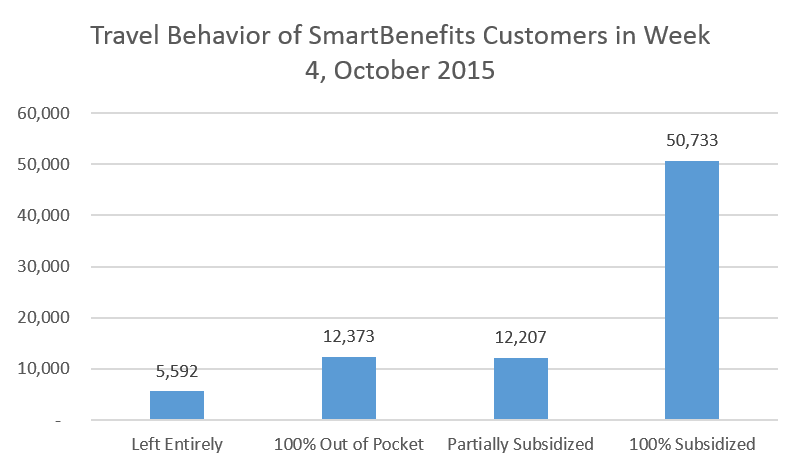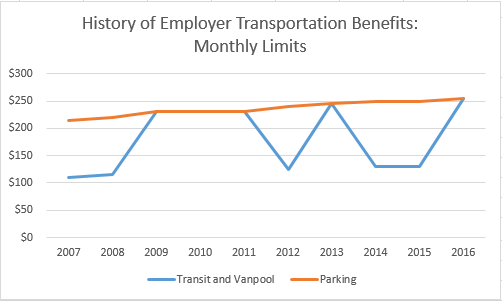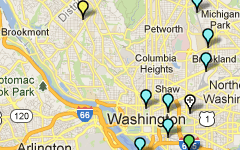Metro Celebrates Permanent Restoration of Transit Benefit
After years of analysis, advocacy and lobbying, Congress has restored the transit commuter benefit to match the parking benefit, helping Metro, the region and the nation.
The employer transportation benefit for transit and vanpools has fluctuated a lot in recent years. In February of 2009, it was increased from $120 to $230, matching the parking benefit. Almost three years later, in January of 2012 it was slashed to $125 only to be raised to $245 the following year. After only a year, it was slashed again, this time to $130 where it stayed for two full years. In January of this year, it was raised to $255 to permanently match the parking benefit. Metro Board of Directors member Tom Bulger — an outspoken advocate for the transit benefit — played a vital role in ensuring its restoration to match the parking benefit. Thanks, Tom!
The benefit amount wasn’t the only thing that has been changing. In 2010, the Metro implemented a series of new IRS rules for how the transit benefit could be used. For example, on smart media the transit benefit dollars had to be stored in a separate “purse” that could only be use for transit fares and not for parking costs at park-and-ride facilities. Employers also began asking employees to specify exactly how much transit fare was needed each month, instead of setting one amount and accruing benefits for trips untaken. Perhaps most importantly, a new rule stated that those unused dollars in this transit-only purse were to be “clawed back” at the end of each month.
Throughout these changing times, Metro analysts were unable to really pin down the impact of the changes to the transit benefit. Most likely, many customers had accrued large balances of transit dollars in their “personal” SmarTrip® purses, buffering and delaying the impacts of the new rules and fluctuations in the available benefit amount. However, when the benefit was cut in January 2014, balances in personal purses were likely depleted resulting in a nearly immediate change in rider behavior. We identified the impact of the cut in the transit benefit back in November of 2014, and noted in January of 2015 that some riders simply stop riding as they run out of SmartBenefits.
As we noted in previous posts, the $130 benefit amount (2014 & 2015) only covered one month of trips on Metrorail for customers whose peak trip cost around $3.25. Customers whose usual peak trip was more expensive had to pay out of pocket at some point during the month. And with a maximum fare of $5.90, many customers had to supplement their transit benefit by $100 or more per month.
To celebrate the restoration of the transit benefit, we analyzed the continued impact of the reduced benefit amount. Using data from October, 2015, we looked at customers who traveled on Metrorail paying with benefits during the first week of the month, and then looked at whether they were still traveling with benefits in the fourth week. The results are compelling. In the fourth week, of the 81,000 customers who traveled with benefits in Week 1:
- 7%, nearly 5,600 customers, left Metrorail entirely
- 15%, around 12,000 customers, ran out of benefits mid-week
- 15%, around 12,000 customers, were paying 100% out of pocket
- 63%, around 51,000, continued to be fully subsidized

Ridership behavior of SmartBenefits customers on the fourth week of October, 2015.
We are excited to assess the impact of the restoration of the transit benefit, so check back for updates in February. In the meantime, let us know in the comments how the changes in transit benefits rules and limits have impacted your travel choices in the Washington region.



Thank You for the nice credit concerning the transit benefit. Other facts are the transit/vanpool benefit is now permanent, parity with the parking benefit has been established and the annual COLA will continue.